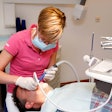
Researchers have found a new cancer panel to find previously undetected viral and cancer mutations in oropharyngeal and laryngeal cancer using next-generation sequencing, according to a presentation at the meeting of the American Society of Clinical Oncology in Chicago.
The panel identified human papillomavirus (HPV) sequences undetected by conventional laboratory tests and also new unreported HPV mutations, which was described in a poster titled, "Detection of novel HPV mutations and chromosomal number imbalance (CNI) in oropharyngeal and laryngeal cancer using next-generation sequencing (NGS)" by researchers from Sanford Health and Chronix Biomedical.
“These powerful new technologies are allowing us to better understand the role of viruses in cancer and the ability to make better treatment decisions patient by patient.”
Of all the cancers reported in the U.S., 3% to 5% are head and neck squamous cell carcinomas (HNSCCs), with more than 40,000 cases reported annually. Survival rates for this type of cancer are poor. Only about 50% of patients will survive over the five-year period following diagnosis. Though incidence of head and neck cancer is on a general decline, correlating with decreasing smoking prevalence, HPV-related HNSCC is increasing at a near epidemic rate with incidence nearly tripling over the last 30 years.
While HPV-positive HNSCCs have an improved survival compared with HPV-negative counterparts, the increasing incidence makes understanding this disease a priority. Although successful in at least 80% of patients, treatments also leave patients with significant morbidity associated with eating and speaking.
In the pilot study, researchers applied advanced NGS techniques to identify tumor-associated mutations in 10 laryngeal and oropharyngeal cancer patients who underwent standard chemoradiation therapy. As a control, two samples from relapsing respiratory papillamatous patients were analyzed.
The single-blinded study looked at biopsied DNA from patients who were either positive or negative by conventional HPV testing. The new test identified HPV sequences in six of the samples, while conventional testing identified only four. The new test agreed with conventional testing in the other five samples that were negative for HPV sequences. Additionally, the new test identified mutations to the HPV sequences previously unreported on HPV databases. Further, the chromosome number imbalance discovered was consistent with oropharyngeal cancers.
 John H. Lee, MD.
John H. Lee, MD.Analyzing a patient's cancer for genetic mutations is the basis for predicting treatment outcomes using various cancer drugs and protocols. Currently, most cancer mutation panels focus on less than 1% of the cancer genome with limited predictive value. The preliminary finding from this study is the basis for a larger planned study designed to match these viral and cancer mutations to clinical outcomes using a vastly expanded panel. By using a more extensive mutation panel, the accuracy of genetic testing could be vastly increased for predicting optimal treatment decisions.
"When you have a tumor in your body it sheds free DNA into the blood. We're trying to use that DNA to detect response to treatment, as well as if a recurrence occurs, and then follow it during treatment to see if we can then track how effective a therapy was prospectively," principal study investigator John H. Lee, MD, a cancer researcher at Sanford Health/University of South Dakota told DrBicuspid.com.
Next will be a larger retrospective study of 150 head and neck cancer patients to analyze their survival in response to therapy, he said.
"These powerful new technologies are allowing us to better understand the role of viruses in cancer and the ability to make better treatment decisions patient by patient. In the next study, we plan to follow up using a blood-based liquid biopsy to determine in real-time the efficacy of the treatment," Dr. Lee said.
The study's lead author Howard Urnovitz, PhD, CEO of Chronix Biomedical, said this new technology increased the amount of data available to make decision-making more precise.
"Current technology uses limited amounts of data to make important treatment decisions. This new technology greatly expands the amount of medically critical data we can use to increase the accuracy of treatment decision-making. This new cancer panel has the potential to significantly enhance patient care while greatly reducing the cost to the healthcare system," he said.
"This new comprehensive genetic cancer panel will make a major contribution with great benefit for cancer patients, because accurate prediction of treatment efficacy can guide therapeutic options, which can be confirmed in weeks through a liquid biopsy," said Ekkehard Schütz, MD, PhD, chief technology officer of Chronix Biomedical.



















